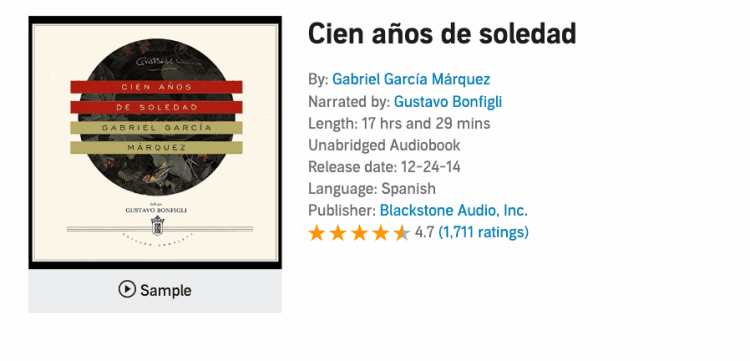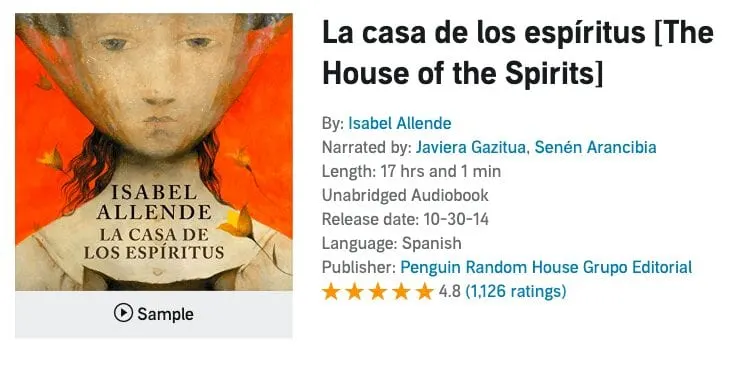Have you ever tried using Spanish audiobooks to improve your language skills?

Why Audiobooks?
Books are great for language learning.
But I’d argue audiobooks might actually be more beneficial.
Sitting down to read a book in a language you don’t quite understand yet can be challenging and difficult to do on a consistent basis.
With everything else that’s going on in your life, it can sometimes be hard to keep up your language learning.
However, there is always time for an audiobook.
Whether you are cleaning the house, commuting to work or brushing your teeth, your day has tons of tiny moments where your brain isn’t doing anything but your body is.
These are the perfect moments to start listening to an audiobook to pick up a new language.
Passive listening
I rarely have the patience to sit down with a book and read something, and things get even harder when I don’t actually recognize all the words and have to put down my book to translate things.
However, an audiobook just runs whether you want it or not. This can be a good or a bad thing, but overall I find myself getting less distracted because the narrator simply carries on with the story, and I find myself catching up to the story in a more natural way without getting frustrated all the time.
The best way of spending your time
It might not seem like much, but using those moments to listen to something in your target language might actually be the thing that ultimately makes you fluent.
As Stephen mentions in his TED talk – think about all the time you spend commuting to work.
In his case, it took him 45 minutes to get to work. That’s 1.5 hours a day, 7.5 hours a week, 30 hours a month, and 360 hours a year you spend doing practically nothing.
He ended up buying an audio course for German, and instead of just listening to music on his way to work he was able to actually use that otherwise wasted time, and through this small adjustment to his daily routine, he ended up actually achieving his goal.
Daily routine
Building on the previous point, the most important thing about language learning is that you are consistent, and because you can listen to audiobooks while partaking in other activities, it’s very easy to make it a part of your daily routine.
Find out what daily activities you could pair with an audiobook, like doing the dishes, etc.
Escaping the linguistic Twilight-zone
When you are learning a foreign language, you often hit that awkward stage where you kind of know the language, but not really. You know, when you’ve outgrown the simple audio scenarios that come with most language learning methods, but you still aren’t quite fluent enough to be able to read an entire book.
It’s a frustrating linguistic Twilight-zone that can be hard to escape.
Instead of trying to listen to brand new content, the best way to get into reading in a foreign language is by reading stuff you have already read in your native language.
Take a book you’ve read before, whether it’s Harry Potter, the Da Vinci Code, or a self-help book you’ve really enjoyed.
Listening over reading
Assuming your goal is to eventually speak your target language, listening more frequently will help you more than just reading it. Now, I am not saying you can only listen to a language. The best way to learn a language is probably by training all four disciplines equally.
But we live in a world where language learning is mostly focussed on reading and writing, and while that is a great way to process language it can often hinder you when trying to speak, especially when you aren’t exposed to the language on a consistent basis.
Get two books for free
If you are interested in trying out some audiobooks in your target language, you can now claim two books for free with an Audible trial. You can cancel anytime, and the books will remain in your library and be accessible at any time.
All the titles mentioned below are available for the free trial.
Besides that, as an Audible member, you also get free access to additional content such as two free audible Audible Originals per month.
How?
Click on any of the links below and sign up for an Audible trial.
After that, your account will have two credits, which means you can pick out any two books you want, add them to your cart and finish your checkout.
CLICK HERE TO CLAIM TWO FREE BOOKS,
or scroll down to find out which books are available in your target language.
Option 1 – Beginner (A1/A2)
If you are still starting out you might benefit the most from going for something specifically targeted towards language learners.
Many audiobooks are made with the sole purpose of teaching new language learners vocabulary in a natural and easy way.
A good example of this is the Paul Noble language courses, which available in Spanish, French, Italian, German, Mandarin and more at various entry levels.
1. Learn Spanish with Paul Noble
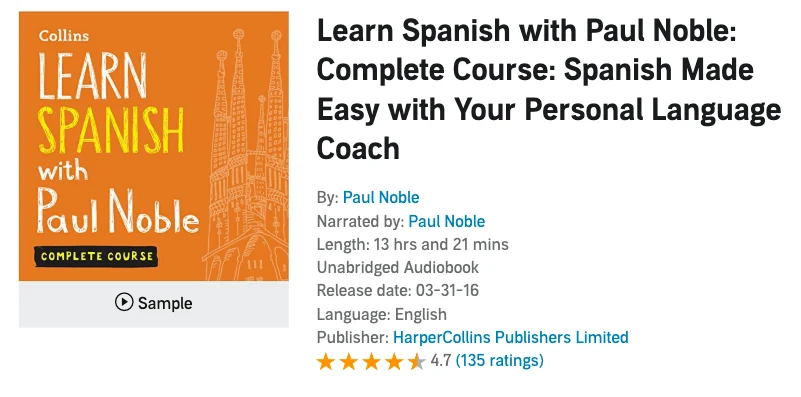
2. Spanish Short Stories for Beginners
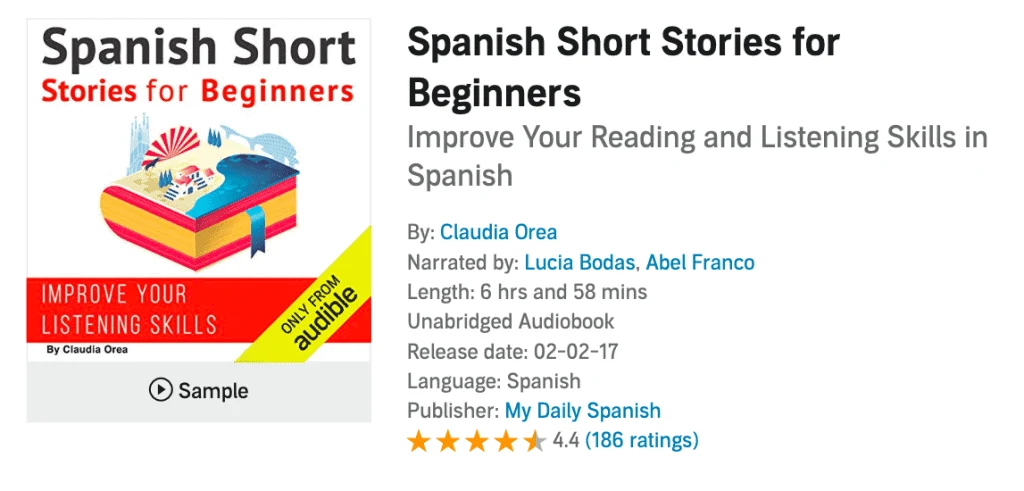
3. Learn Spanish Intermediate Bundle
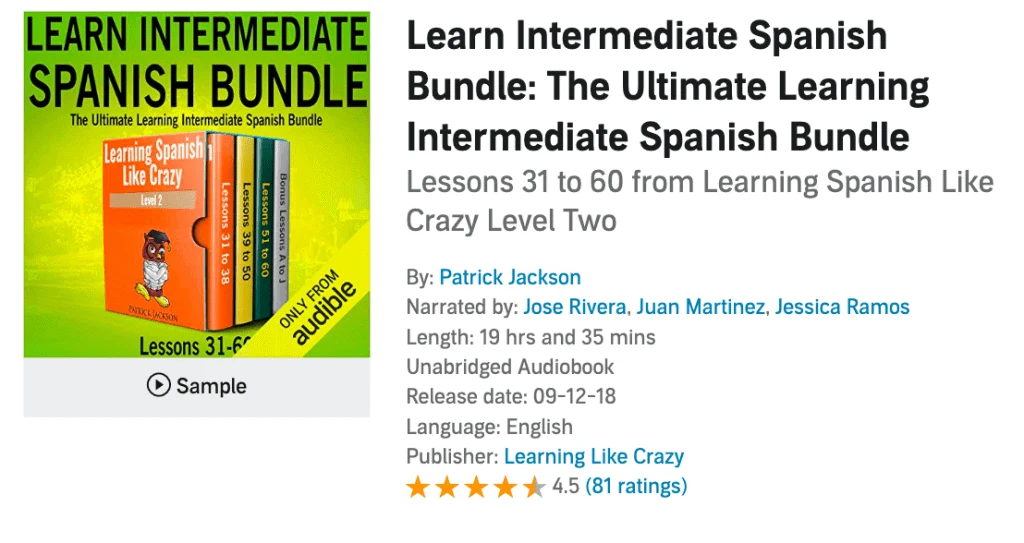
Option 2 – Intermediate (B1/B2)
Okay, so you’re not quite in the beginning stages anymore and you are decently fluent, but you’re not quite fluent enough to tackle a complete book without having to look up words.
This is, in my opinion, the most frustrating phase.
One of my favorite tricks is to listen or read books that I have already read before. This way I already know the general storyline, which makes it easier to guess words from context.
Even if you aren’t able to understand every little word, it won’t affect your understanding of the general storyline and you can still keep listening without being afraid you will miss an important clue.
It’s the easiest way to familiarize yourself with a language in a way that’s enjoyable, effective and won’t leave you pausing every three seconds to look up words.
4. Harry Potter
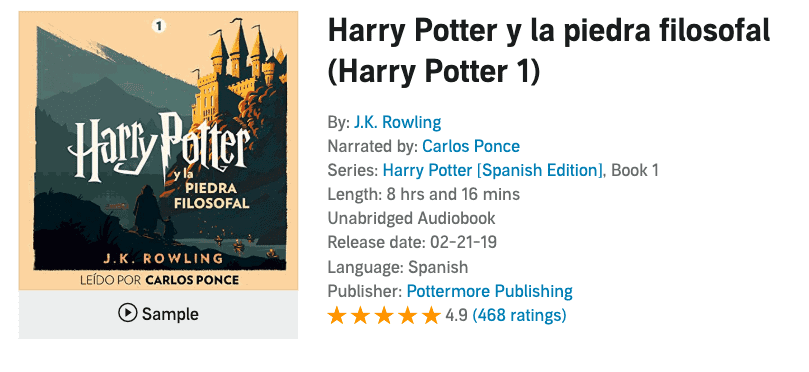
5. The Girl On The Train
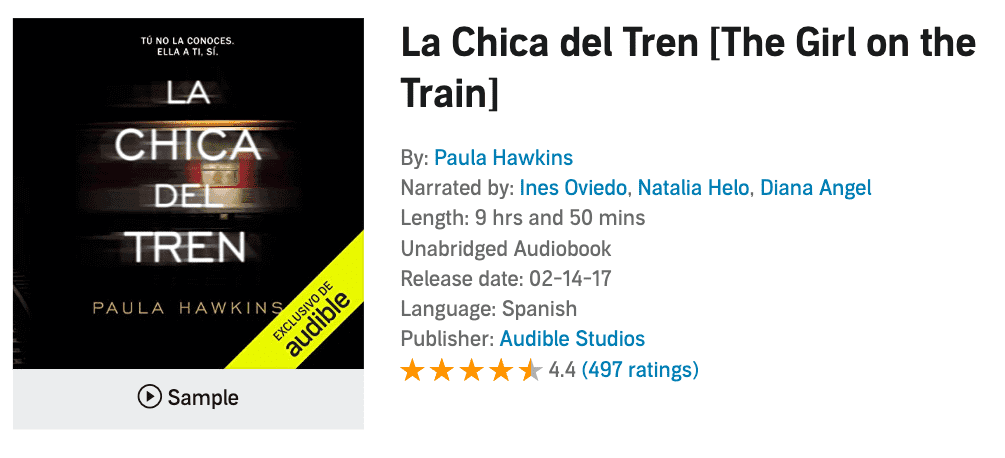
Option 3 – Advanced (C1/C2)
As soon as you’ve reached the advanced levels of fluency, you will most likely be able to tackle any book you like. However, as a non-native speaker, you will probably always find yourself learning new words, no matter how advanced you are.
Actually, even when I read books in my native language I find myself hearing words I am not always familiar with.
One of the advantages of being able to pick any book is being able to read books in their native language.
Instead of trying to opt for books that have been translated, try finding an author that writes in the language you are trying to learn.
This way you can familiarize yourself with the culture in a way that very few people can.
You will also see that this is where you can still learn lots of new things.
In the end, translation is only limited, but the ultimate goal is to stop translating and be able to form thoughts straight from your target language.

